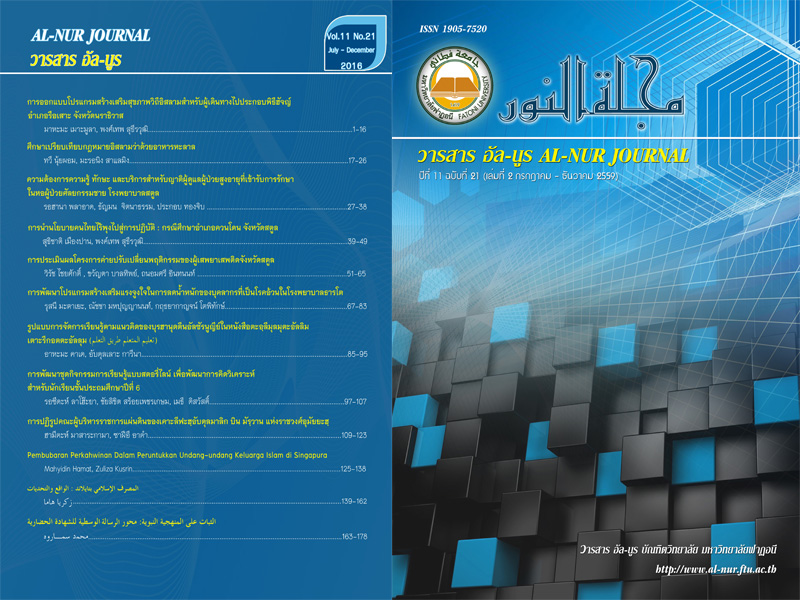ศึกษาเปรียบเทียบกฎหมายอิสลามว่าด้วยอาหารหะลาล
บทคัดย่อ
บทคัดย่อ
การวิจัยนี้มีวัตถุประสงค์เพื่อศึกษาเปรียบเทียบกฎหมายอิสลามว่าด้วยอาหารหะลาลเน้นส่วนวัตถุดิบโดยใช้วิธีการวิจัยเชิงคุณภาพเก็บรวบรวมข้อมูลจากเอกสารใช้วิธีวิเคราะห์ข้อมูลเชิงพรรณา
ผลการวิจัยพบว่าอิสลามให้ความสำคัญเกี่ยวกับเรื่องของอาหารเป็นอย่างยิ่งทั้งนี้เนื่องจากอาหารมีบทบาทและอิทธิพลต่อมนุษย์ในหลายมิติอาหารในอิสลามจะต้องมีคุณสมบัติหลัก 2 ประการคือหนึ่งหะลาลหมายถึงเป็นที่อนุมัติ สองฏอยยิบหมายถึงดีมีประโยชน์ปราศจากโทษถูกต้องตามหลักโภชนาการ
ตัวบทบัญญัติอิสลามว่าด้วยอาหารมี 3 ลักษณะคือ 1. ตัวบทบัญญัติที่ระบุว่าหะลาล 2. ตัวบทบัญญัติที่ระบุว่าหะรอม 3. ไม่มีตัวบทบัญญัติระบุ
โดยหลักการเดิมอาหารทุกชนิดเป็นที่อนุมัติให้บริโภคได้ยกเว้นอาหารที่มีตัวบทห้ามบริโภค ในอัลกุรอานมีอาหารประเภทสัตว์ 10 ชนิดที่ห้ามบริโภค ท่านนบีมุฮัมหมัด(ซ.ล.)ได้ห้ามบริโภคสัตว์บางชนิดเช่น ลาบ้าน นกที่มีกรงเล็บแหลมคม สัตว์ดุร้ายมีเขี้ยว
เนื่องจากปัจจัยการผลิตอาหารหะลาลครอบคลุมวัตถุดิบ กระบวนการผลิต สถานที่ผลิตเครื่องมืออุปกรณ์การผลิต การบรรจุหีบห่อ การเก็บรักษา การขนส่งและการวางจำหน่าย ในขณะที่การวิจัยที่แล้วเสร็จนี้เป็นการศึกษาเฉพาะวัตถุดิบของอาหารหะลาลเท่านั้น จึงควรมีโครงการวิจัยต่อเนื่องจนครอบคลุมปัจจัยการผลิตอาหารหะลาลทั้งหมดคำสำคัญ: แบบวัด, การคิดอย่างมีวิจารณญาณ, เกณฑ์ปกติ
คำสำคัญ: กฎหมายอิสลาม, อาหารหะลาล
This study examines Islamic Law on Halal food, emphasizing on raw materials. Qualitative method was employed in this study. Data were collected from various sources of document. Descriptive analysis was used in data analysis.
The findings in this study show that Islam emphasizes on various aspects of food due to its importance to human lives. According to Islamic principles, food must contain two main aspects i.e. Halal and Tayyib, or nutritious benefits.
Islamic principles on food can be classified into 3 features: 1) the Halal/lawful, 2) the Haram or forbidden, and 3) No specific provision.
The basic of Islamic principles provides that all types of food are lawful, unless proven otherwise. Al-Quran specifies 10 animals that are forbidden for consumption. The Prophet Muhammad (s.w.) prohibited some other animals, including donkey, any birds with sharp claws, any feral animals with fangs.
This research is on raw materials, not all aspects of Halal food. Other research should be undertaken to cover other aspects including production process, production facilities, production equipment, packaging, storage, logistics, and distribution.
Keywords: Islamic Law, Halal Food



